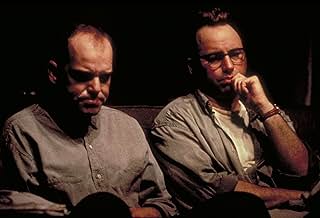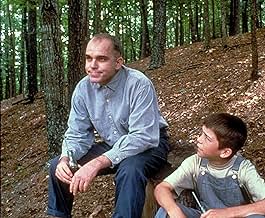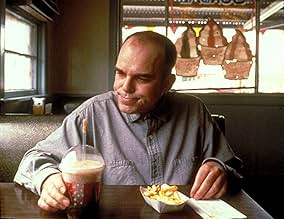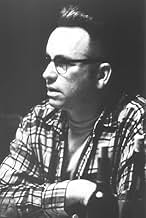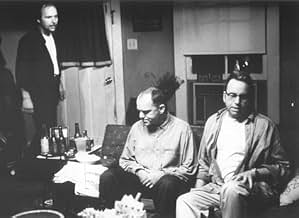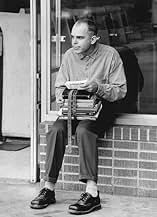Karl Childers, a simple man hospitalized since his childhood murder of his mother and her lover, is released to start a new life in a small town.Karl Childers, a simple man hospitalized since his childhood murder of his mother and her lover, is released to start a new life in a small town.Karl Childers, a simple man hospitalized since his childhood murder of his mother and her lover, is released to start a new life in a small town.
- Won 1 Oscar
- 14 wins & 15 nominations total
Christine Renee Ward
- Melinda
- (as Christy Ward)
Bruce Hampton
- Morris
- (as Col. Bruce Hampton Ret.)
- Director
- Writer
- All cast & crew
- Production, box office & more at IMDbPro
8.0103.6K
1
2
3
4
5
6
7
8
9
10
Featured reviews
A brilliant slice of life...excellent performances...
No film in recent years has held me as spellbound as SLING BLADE, written by BILLY BOB THORNTON (for which he won an Oscar for Best Screenplay), and starring the actor in a memorable role for which he was Oscar nominated but failed to win.
He becomes the character with such truth--and such emotional underplaying--that he makes the whole story even more moving than it would have been with any other actor in the leading role. He plays a retarded man released from prison after serving twenty-five years for killing his mother and her lover with a sling blade. He felt morally justified because he saw their act of love as evil, only later realizing that it was wrong to kill them.
We follow his release, first accepted with kindness by a local repair shop where he reveals himself to be skilled at fixing motors, then received into the family of a boy he's befriended, played wonderfully by LUCAS BLACK. Unfortunately, the family life is ruined by a violently dysfunctional man called Doyle (DWIGHT YOAKAM) who is a crude bully and redneck full of bitter hatred and resenting the intrusion of Thornton and the boy and possessive in his relationship with the mother.
The biggest weakness in the screenplay is figuring out why the mother would ever be attracted by such a bigoted bully. Yoakam plays him in a ruthless manner that shows no compassion for the character and he's so evil that you have to wonder about the mother's mental faculties in letting him even near the family. It's also hard to believe that she would let the retired man use her garage for shelter on such short acquaintance with her son. But hey, this is a movie, this is the script, and that's it.
All of the acting is uniformly excellent, particularly BILLY BOB THORNTON, who was nominated and would have deserved the Oscar for his penetrating study of a retarded man without a single false note.
Tension builds because the viewer is aware that some sort of confrontation has to happen between Karl (Thornton) and Doyle. It's a matter of waiting to see what develops and that's what keeps the viewer hooked onto the story and wondering how it will conclude.
It's a fully realized slice of life, Southern style with hillbilly overtones, always centered on the main thrust of the story without ever losing its touch, rich in atmospheric detail. J.T. WALSH as a fellow inmate is impressive, as is JOHN RITTER (whom I didn't even recognize at first) as a sympathetic gay man, amazingly real in a serious role. ROBERT DUVALL has a cameo bit as an indifferent father that he plays faultlessly.
Summing up: Brilliant film, highly recommended and involving a very touching relationship between the small boy and the retarded man.
He becomes the character with such truth--and such emotional underplaying--that he makes the whole story even more moving than it would have been with any other actor in the leading role. He plays a retarded man released from prison after serving twenty-five years for killing his mother and her lover with a sling blade. He felt morally justified because he saw their act of love as evil, only later realizing that it was wrong to kill them.
We follow his release, first accepted with kindness by a local repair shop where he reveals himself to be skilled at fixing motors, then received into the family of a boy he's befriended, played wonderfully by LUCAS BLACK. Unfortunately, the family life is ruined by a violently dysfunctional man called Doyle (DWIGHT YOAKAM) who is a crude bully and redneck full of bitter hatred and resenting the intrusion of Thornton and the boy and possessive in his relationship with the mother.
The biggest weakness in the screenplay is figuring out why the mother would ever be attracted by such a bigoted bully. Yoakam plays him in a ruthless manner that shows no compassion for the character and he's so evil that you have to wonder about the mother's mental faculties in letting him even near the family. It's also hard to believe that she would let the retired man use her garage for shelter on such short acquaintance with her son. But hey, this is a movie, this is the script, and that's it.
All of the acting is uniformly excellent, particularly BILLY BOB THORNTON, who was nominated and would have deserved the Oscar for his penetrating study of a retarded man without a single false note.
Tension builds because the viewer is aware that some sort of confrontation has to happen between Karl (Thornton) and Doyle. It's a matter of waiting to see what develops and that's what keeps the viewer hooked onto the story and wondering how it will conclude.
It's a fully realized slice of life, Southern style with hillbilly overtones, always centered on the main thrust of the story without ever losing its touch, rich in atmospheric detail. J.T. WALSH as a fellow inmate is impressive, as is JOHN RITTER (whom I didn't even recognize at first) as a sympathetic gay man, amazingly real in a serious role. ROBERT DUVALL has a cameo bit as an indifferent father that he plays faultlessly.
Summing up: Brilliant film, highly recommended and involving a very touching relationship between the small boy and the retarded man.
Thoroughly Thornton!
A magnificent film! Watching Billy Bob, I was reminded of Bo Radley (Robert Duvall)in To Kill a Mockingbird. The irony of seeing Duvall in Sling Blade made it that much more rewarding. Yes, it's true, the ending was inevitable, but so what? The journey to the end was what made this film the gem that it is. Dwight Yoakam made my skin crawl, and Lucas Black as little Frank brought out my motherhood instinct. Protect that boy, Karl! And he did. This had all the elements of a great film: an unselfish hero who brings about changes in the lives of others in a meaningful way. Granted, had his mental capabilities been greater he might have made another choice. Given the circumstances of the film, there was no other choice.
Probably one of Thornton's finest movies
I guess the main reason why I wanted to see this movie was because it was written and directed by Billy Bob Thornton, who also played a role in it. Even though the man hasn't really been able to prove a lot with his work as a director, I must say that I almost always appreciate him as an actor. He's perhaps not the most popular actor in Hollywood, but in my opinion he sure is one of the better ones.
In this movie he plays the role of Karl Childers, a grown, but simple man who is released from the psychiatric hospital where he has been hospitalized since the age of twelve. He had to stay in that hospital for so long because he murdered his own mother and her lover, believing that they were doing something wrong. He returns to the town where he lived the first twelve years of his life and it doesn't take long for him to get a job as a mechanic, fixing all kinds of small motors at a local repair shop. In the same town he also meets Frank, a young and friendly boy who immediately seems to like this strange man. Soon Karl is invited by Frank's mother to stay in their garage, much against the will of her alcoholic and abusive boyfriend Doyle. While Karl's friendship with Frank gets stronger, the tension between him and Doyle keeps building up, until reaching its final climax...
Now that I've finally seen this movie, I can only say that it's too bad that I didn't give it a try earlier. Especially thanks to the magnificent performance by Billy Bob Thornton, this is a movie that is more than just worth a watch. But also the other actors like Dwight Yoakam, Natalie Canerday,... did a very good job. The entire movie feels very realistic, is quite sober and never tries to be too dramatic. This is the kind of movie that could have become very preachy, but it hasn't and that's something that I really appreciate. Add to this some good directing and you know that Thornton has done a very nice job with this movie.
This isn't exactly a typical Hollywood movie, not in its story and certainly not in its approach towards the subject. This could easily have become some kind of cheesy TV-movie, but Billy Bob Thornton has made a very good movie out of it instead. I really appreciated his work as a director, actor and writer in this movie, liked the story and was intrigued by the acting of all the actors. That's why I give it a 7.5/10, maybe even an 8/10.
In this movie he plays the role of Karl Childers, a grown, but simple man who is released from the psychiatric hospital where he has been hospitalized since the age of twelve. He had to stay in that hospital for so long because he murdered his own mother and her lover, believing that they were doing something wrong. He returns to the town where he lived the first twelve years of his life and it doesn't take long for him to get a job as a mechanic, fixing all kinds of small motors at a local repair shop. In the same town he also meets Frank, a young and friendly boy who immediately seems to like this strange man. Soon Karl is invited by Frank's mother to stay in their garage, much against the will of her alcoholic and abusive boyfriend Doyle. While Karl's friendship with Frank gets stronger, the tension between him and Doyle keeps building up, until reaching its final climax...
Now that I've finally seen this movie, I can only say that it's too bad that I didn't give it a try earlier. Especially thanks to the magnificent performance by Billy Bob Thornton, this is a movie that is more than just worth a watch. But also the other actors like Dwight Yoakam, Natalie Canerday,... did a very good job. The entire movie feels very realistic, is quite sober and never tries to be too dramatic. This is the kind of movie that could have become very preachy, but it hasn't and that's something that I really appreciate. Add to this some good directing and you know that Thornton has done a very nice job with this movie.
This isn't exactly a typical Hollywood movie, not in its story and certainly not in its approach towards the subject. This could easily have become some kind of cheesy TV-movie, but Billy Bob Thornton has made a very good movie out of it instead. I really appreciated his work as a director, actor and writer in this movie, liked the story and was intrigued by the acting of all the actors. That's why I give it a 7.5/10, maybe even an 8/10.
10theENK
Convincing and thought provoking.
Sling Blade is a very well acted, well displayed, and interesting masterpiece. I just loved it from beginning to end.
First I would like to comment on the excellent acting across the board, especially the late John Ritter and Billy Bob Thornton's ensemble portrayal of Karl. I could not help but feel very attached to Karl from the opening scene, his release from the mental institution, his struggles with the outside world, and how he related to the town people. Sling Blade is one of those movies that I would love to sit down and talk about for hours with a friend. I would also love to hear others' perspectives about what made this movie great.
It seems that every scene was worked to perfection. From the lighting and camera's viewpoint to the acting and music. I enjoyed every scene, but thought that three really stood out. Without giving too much away, they are as follows. No spoilers here:
1. Inside the house after band practice where Karl does not move from the couch.
2. When Karl is visited at work and we see him make eye contact for the first time.
3. The scene where Karl is in the garage late at night. The chilling music really captures the mood. My heart was pounding during this one!
I hold Mr. Thornton to a very high respect. He created a masterpiece that is emotional, thrilling, dramatic, humorous, and entertaining.
First I would like to comment on the excellent acting across the board, especially the late John Ritter and Billy Bob Thornton's ensemble portrayal of Karl. I could not help but feel very attached to Karl from the opening scene, his release from the mental institution, his struggles with the outside world, and how he related to the town people. Sling Blade is one of those movies that I would love to sit down and talk about for hours with a friend. I would also love to hear others' perspectives about what made this movie great.
It seems that every scene was worked to perfection. From the lighting and camera's viewpoint to the acting and music. I enjoyed every scene, but thought that three really stood out. Without giving too much away, they are as follows. No spoilers here:
1. Inside the house after band practice where Karl does not move from the couch.
2. When Karl is visited at work and we see him make eye contact for the first time.
3. The scene where Karl is in the garage late at night. The chilling music really captures the mood. My heart was pounding during this one!
I hold Mr. Thornton to a very high respect. He created a masterpiece that is emotional, thrilling, dramatic, humorous, and entertaining.
10wdmickel
Absolutely Amazing!
I can't believe it took me so long to finally see this movie and I must admit I had never seen any work by Billy Bob Thornton. Without a doubt, Sling Blade is one of the finest pieces of work ever put on film. Billy Bob's performance as Karl Childers is absolutely riveting! I found myself completely fascinated by this character. The entire ensemble of characters are superbly cast. The child actor who plays Frank is talented beyond his years. This story unfolds in many layers, with friendship and love woven between bigotry and cruelty. It begins with a somewhat horrible description of the double murder of Karl's mother and her lover, but yet is tastefully done with words, no cheap views of blood and gore. It shows how the lack of parental love and understanding can form an individual, but also how the human heart can still have the capacity to be open, as in the relationship between Karl and Frank. You'll feel completely drawn into this little family with its pain and problems.
This is a masterpiece of superb acting, writing and directing! If you haven't seen it yet, please don't deny yourself the opportunity of viewing one of the most amazingly touching movies you will ever see. Even in the company of great performances by Tom Hanks and Dustin Hoffman, I think Sling Blade leaves Forrest Gump and Rain Man in the dust!
This is a masterpiece of superb acting, writing and directing! If you haven't seen it yet, please don't deny yourself the opportunity of viewing one of the most amazingly touching movies you will ever see. Even in the company of great performances by Tom Hanks and Dustin Hoffman, I think Sling Blade leaves Forrest Gump and Rain Man in the dust!
Did you know
- TriviaAccording to Billy Bob Thornton in a February 7, 1997 interview on Howard Stern's radio show, Karl living behind a shed is based on a boy where he grew up who could not walk or talk very well, so his parents kept him in a shed out back. Billy said the boy's mother was scared by a snake when she was pregnant, so they felt he was a child of the devil. They kept him locked up and fed him like a dog. It turned out the boy had polio.
- GoofsWhen Karl is talking to the Frostee Cream Boy, there are no cars on the road behind him. But whenever the camera is aimed at the Frostee Cream, there is a lot of traffic on the road reflected in the window. Billy Bob Thornton points out in the DVD commentary that this is because the local police had another pressing issue the day they filmed Jim Jarmusch, and they couldn't be there to stop traffic.
- Crazy creditsThe opening credits start about 18 minutes into the film.
- Alternate versionsThe Director's Cut runs 12 minutes longer than the original theatrical releases.
- SoundtracksThe One I Love
(instrumental)
Written by Ali Jennings and Daniel Lanois
Performed by Ali Jennings
Courtesy of Daniel Lanois, Ali Jennings Songs/Socan, Daniel Lanois Songs/Socan
Details
- Release date
- Country of origin
- Official sites
- Language
- Also known as
- Resplandor en la noche
- Filming locations
- Production companies
- See more company credits at IMDbPro
Box office
- Budget
- $1,000,000 (estimated)
- Gross US & Canada
- $24,444,121
- Opening weekend US & Canada
- $28,139
- Dec 1, 1996
- Gross worldwide
- $24,444,121
Contribute to this page
Suggest an edit or add missing content



